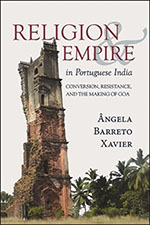It would be fitting to state at the outset that this is an important book. For many reasons, but mostly because it speaks with ease to many audiences. Ângela Barreto Xavier’s convincing narrative comes from an evident expertise in her Portuguese sources as much as from a deep engagement with current debates across themes in Indian and Iberian history.
The title encapsulates the two main themes of Portuguese imperialism and Christian conversion in the territory of Goa. But this book asks to be read in multiple registers. Iberian colonial hegemony and its agents, conversion and its tools, strategies and achievements, the formation of new identities, communities and imaginations, and the transition from pre-modern political systems to modern ones.
The approach to all these themes of interest is acutely interrogative. Xavier adopts a perspective that insists on recovering processes that were ongoing. She relates these to multiple contexts that informed and impacted each other in a ceaseless dynamism. She draws attention to connections between far-flung occurrences in imagining the contexts. All the while, she finds multiple participants in a steady flow in historical time. For all these reasons her research speaks specifically to specialists with an interest in the primary themes of the book as much as generically to historians and students of early modern empires.

